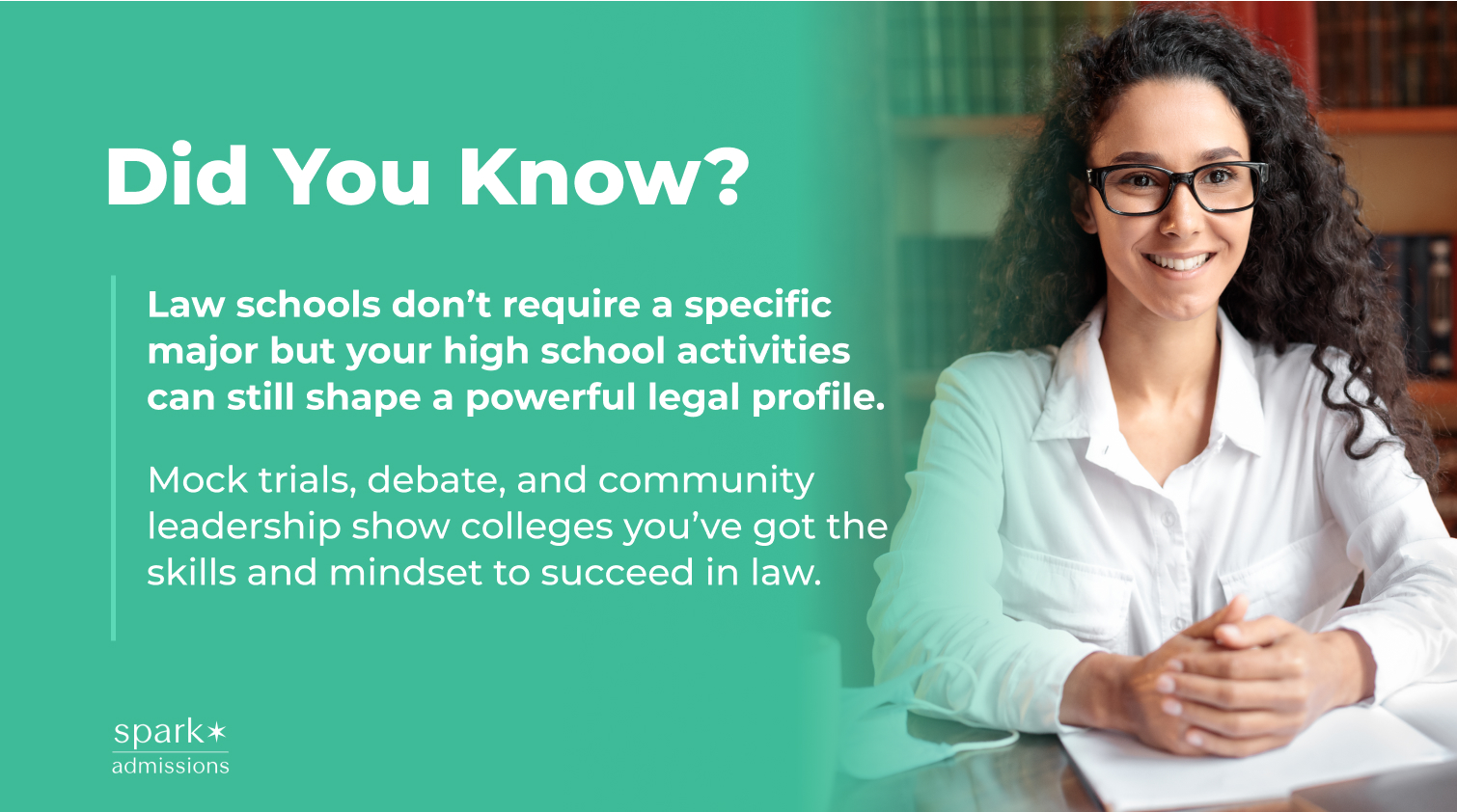- Blog
- > Navigating High School
Best Extracurriculars for Pre-Law Students in High School
- Dr. Rachel Rubin
- | August 5, 2025

If you’re a high school student considering a future in the legal profession, your extracurricular activities can make a major difference, both in the college admissions process and your eventual law school application. While law schools don’t require a specific major or checklist of activities, they do seek students with strong writing, public speaking, and critical thinking skills, along with a deep interest in public service or the legal field.
Whether you’re applying Early Decision, Early Action, or through regular admissions, Top 50 colleges and universities want to see how you’ve used your free time outside the classroom. Activities that demonstrate leadership, service, communication, and a passion for justice can elevate your profile and lay a strong foundation for your law school resume.
Here are the best extracurriculars for students interested in law school, including what makes them compelling, how they align with a future legal career, and how to choose the right balance for your schedule.

Extracurricular Opportunities That Enhance Law School Admissions
While your law school application won’t happen until after college, your high school activities play a foundational role in preparing you for the road ahead. Gaining experience in public advocacy, writing, debate, and community service will help you develop the personal and academic strengths needed to succeed in a law school class.
These same extracurriculars also provide the material for future letters of recommendation, personal statements, and interviews. Whether you’re applying to major in political science, criminal justice, or philosophy, your activities now help to shape the narrative you’ll present later to law school admissions offices and even major law firms.
Mock Trial and Moot Court
One of the most effective ways to demonstrate legal interest in high school is by joining a mock trial team or moot court program. These activities immerse students in simulated court cases, helping them develop public speaking, legal analysis, and time management skills. You’ll gain experience in constructing arguments, questioning witnesses, and delivering opening and closing statements, just like a real attorney.
Both mock trial and moot court mirror the kind of thinking and communication required in the legal profession, making them ideal extracurriculars for students considering law school. Leadership roles within your team show even deeper engagement and help you stand out to admissions officers.
Debate Club or Speech & Debate
Participating in debate club is another great way to build the legal skills that matter most: analytical reasoning, logic, rhetoric, and persuasive communication. Whether you’re competing in Lincoln-Douglas, policy, or parliamentary formats, you’ll learn how to develop structured arguments, think on your feet, and engage in respectful disagreement.
Students who reach regional or national levels of competition often gain recognition from college admissions committees, especially when debate complements their broader interests in justice, politics, or advocacy. Debate is also excellent preparation for crafting a compelling personal statement, both for college and later in your law school application.
Model United Nations (Model UN)
Model UN is a popular activity for students interested in law school, political science, and international affairs. It offers opportunities to engage with global issues, negotiate resolutions, and develop public speaking and diplomacy skills. Model UN also introduces students to the workings of international law, which can be especially appealing for those interested in a career in human rights or international policy.
Serving as a delegate, chair, or conference organizer demonstrates initiative, leadership skills, and the ability to engage with complex topics, all of which are attractive to both undergraduate and law school admissions committees.
Student Government and Leadership Roles
A strong legal career often involves civic engagement, so participating in student government is a natural fit for future lawyers. Whether you run for class president, manage club budgets, or advocate for school-wide policy changes, these experiences teach negotiation, leadership, and real-world problem-solving.
Holding a leadership role in student government also shows that you’re capable of managing substantial time commitments, a key trait for balancing academics and extracurriculars in college and eventually in law school.
Community Service and Public Service Projects
Because law is a service profession, colleges and law schools value students who show a consistent commitment to public service. Volunteering with legal aid organizations, political campaigns, or local nonprofits is a good way to develop empathy and social awareness while contributing to your community.
Even volunteering at an animal shelter, food pantry, or tutoring program can demonstrate your sense of responsibility and care for others. The key is to engage meaningfully and, when possible, take on leadership or organizational roles. These service activities reflect the values that align with the legal field and help shape your law school personal statement down the line.
Interning at Law Firms or Legal Organizations
Gaining exposure to the legal profession through internships or shadowing opportunities is one of the most direct paths to understanding what law careers look like. Many law firms offer short-term internships or mentorship programs to high school students, especially during the summer.
Spending time in a law office introduces you to real casework, legal terminology, and professional conduct. Even a week-long shadowing experience can give you something substantial to discuss in your college application and future law school resume. Internships also help you decide which areas of law most interest you, from family law to environmental law to corporate litigation.
Journalism, Creative Writing, and Research
Strong writing skills are essential for any aspiring lawyer. Admissions officers appreciate students who have developed their writing talents through consistent involvement in the school newspaper, literary magazine, or even independent blogging or creative writing.
These activities demonstrate your ability to express ideas clearly, analyze information, and communicate persuasively. If possible, explore topics that relate to law, justice, or social issues. Conducting legal research or writing about current events can also help demonstrate your intellectual engagement with the legal field.
Foreign Language and Cultural Studies
While not an obvious path to law, studying a foreign language or engaging in international programs can help prepare you for a globalized legal environment. Understanding another language or culture expands your communication skills and can be a valuable asset if you pursue international law or work with diverse clients.
Programs that include exchange or cultural immersion are also a great way to stand out, particularly when paired with other law-related extracurriculars.

Depth Over Distraction
With so many extracurricular activities available to high school students, it’s tempting to fill your resume with a long list of clubs, competitions, and service projects. But when it comes to building a strong case for college admissions and eventually a law school application, quality beats quantity every time.
Rather than spreading yourself thin across unrelated activities, think strategically about how your free time reflects your commitment to the legal field. Admissions committees are drawn to students who pursue a few interests with intention—deepening their legal skills, assuming leadership roles, and making a tangible impact. For example, advancing from participant to lead attorney on your mock trial team, or organizing a district-wide public service campaign, tells a much stronger story than a surface-level involvement in ten different clubs.
That doesn’t mean variety has no value. In fact, combining experiences like debate, journalism, and community service can demonstrate versatility and well-rounded growth. The key is cohesion. Your activities should point toward a clear theme: a future in law, a passion for justice, and the personal qualities needed to thrive in a demanding, service-oriented profession.
High School Is All About Discovery
Use your high school years to explore what drives you, but as you progress, lean into the areas where you can make a difference. With thoughtful time management and authentic engagement, you’ll build an extracurricular profile that resonates with both college admissions and future law school admissions committees.
Start Early, Think Strategically
If you’re a high school student who dreams of becoming a future lawyer, don’t wait until college to start preparing. By choosing meaningful, law-aligned extracurriculars, you’ll develop important legal skills, gain leadership experience, and show commitment to the field.
Focus on a few key areas like mock trial, debate, student government, and public service, and take them seriously. Over time, your dedication will not only strengthen your college application, but also position you for a successful law school journey.
At Spark Admissions, we help ambitious high school students craft strategic, individualized plans that prepare them for success in both college and law school. Whether you’re aiming for a Top 50 college or planning your future in the legal profession, our expert counselors will help you make every activity count.
Schedule a free consultation today and take the next step toward a standout application and a future career in law.


